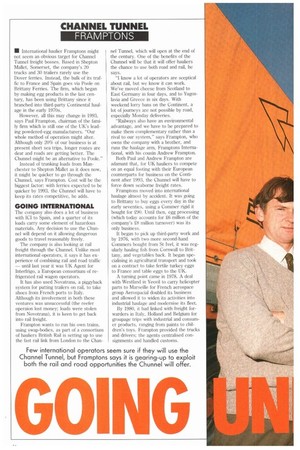CHANNEL TUNNEL FRAMPTONS
Page 56

If you've noticed an error in this article please click here to report it so we can fix it.
• International haulier Framptons might not seem an obvious target for Channel Tunnel freight bosses. Based in Shepton Mallet, Somerset, the company's 20 trucks and 30 trailers rarely use the Dover ferries. Instead, the bulk of its traffic to France and Spain goes via Poole on Brittany Ferries. The firm, which began by making egg products in the last century, has been using Brittany since it branched into third-party Continental haulage in the early 1970s.
However, all this may change in 1993, says Paul Frampton, chairman of the family firm which is still one of the UK's leading powdered-egg manufacturers. "Our whole method of operation might alter. Although only 20% of our business is at present short sea trips, longer routes are dear and roads are getting better. The Chunnel might be an alternative to Poole."
Instead of trunking loads from Manchester to Shepton Mallet as it does now, it might be quicker to go through the Chunnel, says Frampton. Cost will be the biggest factor: with ferries expected to be quicker by 1993, the Chunnel will have to keep its rates competitive, he adds.
GOING INTERNATIONAL
The company also does a lot of business with ICI to Spain, and a quarter of its loads carry some element of hazardous materials. Any decision to use the Chunnel will depend on it allowing dangerous goods to travel reasonably freely.
The company is also looking at rail freight through the Chunnel. Unlike most international operators, it says it has experience of combining rail and road traffic — until last year it was UK Agent for Interfrigo, a European consortium of refrigerated rail wagon operators.
It has also used Novatrana, a piggyback system for putting trailers on rail, to take shoes from French ports to Italy. Although its involvement in both these ventures was unsuccessful (the reefer operaion lost money; loads were stolen from Novotrana), it is keen to get back into rail freight.
Frampton wants to run his own trains, using swap-bodies, as part of a consortium of hauliers British Rail is setting up to use the fast rail link from London to the Chan nel Tunnel, which will open at the end of the century. One of the benefits of the Chunnel will be that it will offer hauliers the chance to use both road and rail, he says.
"I know a lot of operators are sceptical about rail, but we know it can work. We've moved cheese from Scotland to East Germany in four days, and to Yugoslavia and Greece in six days. With weekend lorry bans on the Continent, lot of journeys are not possible by road, especially Monday deliveries.
"Railways also have an environmental advantage, and we have to be prepared to make them complementary rather than a rival to our system," says Frampton, who owns the company with a brother, and runs the haulage arm, Framptons International, with his cousin Andrew Frampton, Both Paul and Andrew Frampton are adamant that, for UK hauliers to compete on an equal footing with their European counterparts for business on the Continent after 1993, the Chunnel will have to force down seaborne freight rates.
Framptons moved into international haulage almost by accident. It was going to Brittany to buy eggs every day in the early seventies, using a Commer rigid it bought for i'90. Until then, egg processing (which today accounts for Ai million of the company's 28 million turnover) was its only business.
It began to pick up third-party work and by 1976, with two more second-hand Conuners bought from St lye!, it was regularly hauling fish from Cornwall to Brittany, and vegetables back. It began specialising in agricultural transport and took on a contract to take fertile turkey eggs to France and table eggs to the UK.
A turning point came in 1978. A deal with Westland in Yeovil to carry helicopter parts to Marseille for French aerospace group Aerospacial doubled its business and allowed it to widen its activities into industrial haulage and modernise its fleet.
By 1980, it had linked with freight forwarders in Italy, Holland and Belgium for groupage trips with industrial and consumer products, ranging from paints to children's toys. Frampton provided the trucks and drivers; the agents centralised consignments and handled customs.
















































































































